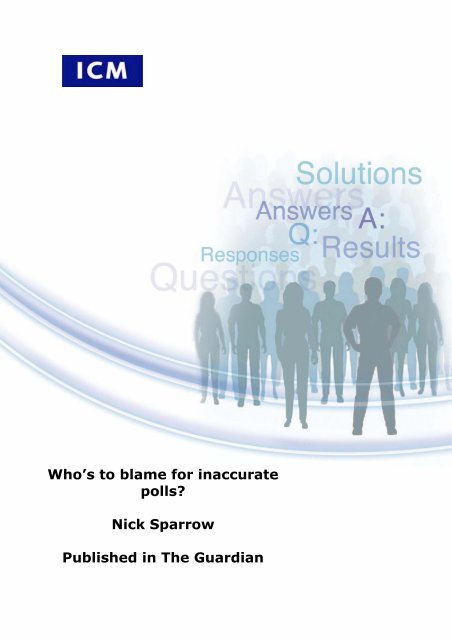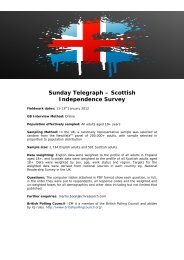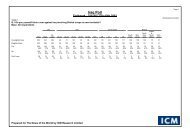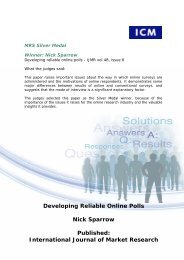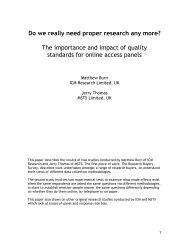Who's to blame for inaccurate polls? Nick Sparrow ... - ICM Research
Who's to blame for inaccurate polls? Nick Sparrow ... - ICM Research
Who's to blame for inaccurate polls? Nick Sparrow ... - ICM Research
- No tags were found...
You also want an ePaper? Increase the reach of your titles
YUMPU automatically turns print PDFs into web optimized ePapers that Google loves.
Who’s <strong>to</strong> <strong>blame</strong> <strong>for</strong> <strong>inaccurate</strong><strong>polls</strong>?<strong>Nick</strong> <strong>Sparrow</strong>Published in The Guardian
A round table discussion at the big post election conference at Sussex University <strong>to</strong>day willdiscuss the record of the opinion <strong>polls</strong> in the 2001 election. Can we expect Gallup Mori andNOP <strong>to</strong> repeat their own congratula<strong>to</strong>ry message? On the Friday following election day theysaid they had “confounded their critics ….. who had poured scorn on them throughout thecampaign”. The final campaign <strong>polls</strong> had been “the most accurate since 1987”.More objective analysis suggests the polling industry as a whole has little <strong>to</strong> crow about.The table compares the final <strong>polls</strong> with the outcome of each of the last eight elections,showing the closest estimate in each case and the range of other poll predictions. Theclosest in 2001 (<strong>ICM</strong>/Guardian) was 0.6% adrift, the most <strong>inaccurate</strong> estimate askew by2.8% in Labours’ favour. 2001 fits the pattern of the previous two general elections and sixout of the last eight in that the <strong>polls</strong> have mostly overstated Labour’s advantage. If theproblem were sampling error we should be able <strong>to</strong> observe a range of predictions aroundthe correct result, instead we see errors mostly in the same direction indicating not errorbut bias!Table 1. Average Errors* In Final Polls 1974 To 2001Tory BiasLabour Bias*Average error is the average of the differences between the estimated percentage <strong>for</strong> eachparty and the actual resultIn 2001, criticism of the <strong>polls</strong> reflected their per<strong>for</strong>mance throughout the campaign, and onthis basis the <strong>polls</strong> were even further adrift. The final <strong>polls</strong> suggested that Labour wouldwin by 15%, but over the course of the whole campaign the <strong>polls</strong> had suggested on averagethat Labours advantage was 17%, almost double what they actually achieved. Indeed threeput Labour ahead by 25% or more.Critics could also pull out all the regular monthly <strong>polls</strong> going back <strong>to</strong> 1992. Except <strong>for</strong> abrief spell be<strong>for</strong>e Black Wednesday and a couple of months during the petrol crisis most ofthe national <strong>polls</strong> have suggested Labour would do better than they have actually achievedin any election held over that period. The only hope <strong>for</strong> the <strong>polls</strong>ters is <strong>to</strong> <strong>blame</strong> the voters<strong>for</strong> not acting as they say they intended; the worry must be that their methods are crooked.One excuse offered was that there was late swing which mainly benefited the LiberalDemocrats. Another was that there were substantial numbers of late decisions by
traditional Labour supporters not <strong>to</strong> turn out. Data from <strong>polls</strong> conducted on behalf of theGuardian and the BBC allows us <strong>to</strong> examine whether these fac<strong>to</strong>rs could have upset the<strong>polls</strong>. <strong>ICM</strong> recontacted 1,533 people on election day who had previously been asked howthey intended <strong>to</strong> vote in <strong>polls</strong> originally conducted between Thursday and Monday precedingpolling day. The sum of the differences between what these people said they intended <strong>to</strong> dobe<strong>for</strong>e polling day and what they reported having done on election day shows that Labourlost a maximum of 1% over the course of the last few days <strong>to</strong> late swing and non turnout byits own supporters. This explains only a small fraction of the error in the estimates made bymost <strong>polls</strong>ters.Are the <strong>polls</strong>ters methods there<strong>for</strong>e wrong? Pollsters hope that by getting the demographicprofile of their samples <strong>to</strong> match the whole population, <strong>polls</strong> will give an accurate picture ofvoting intentions. Trouble is the days when all the <strong>to</strong>ffs voted Tory and the flat cappedworking classes supported Labour have long gone. A demographically representative poll isno longer necessarily politically balanced. Added <strong>to</strong> which, response rates are low andfalling. Some groups within the population are difficult <strong>to</strong> interview and some don’t want <strong>to</strong>reveal their voting intentions. But at present the <strong>polls</strong>ters simply replace refusers withothers who share the same demographic profile, ignoring the possibility that, in doing so, itmay be easier <strong>to</strong> find Labour voters willing <strong>to</strong> reveal that they will support a party theyperceive is popular than get Conservatives <strong>to</strong> admit supporting a much less fashionablealternative.You would have thought that most people could remember how they voted in the lastelection. Yet according <strong>to</strong> one poll conducted just three weeks after the 2001 election only26% remembered having voted Conservative (7% <strong>to</strong>o low) while 48% said they had votedLabour (6% <strong>to</strong>o high). On the face of it, such <strong>polls</strong> simply contain <strong>to</strong>o many Labour votersand <strong>to</strong>o few Tories.So why not use past voting behaviour <strong>to</strong> ensure the <strong>polls</strong> are demographically and politicallyrepresentative? Some say you can’t trust past votes because some people <strong>for</strong>get how theyvoted and others align past votes <strong>to</strong> present intentions, but it’s the only candidate in <strong>to</strong>wn.Of course <strong>polls</strong>ters have <strong>to</strong> make some allowance <strong>for</strong> faulty recall, but the indications arethat if the <strong>polls</strong>ters were <strong>to</strong> target recall votes closer <strong>to</strong> the outcome last time they will alsoget more accurate predictions.Over the whole 2001 campaign Gallup, Mori and NOP suggested the Liberal Democratswould obtain 14% of the popular vote while their final <strong>polls</strong> predicted they would get 17%, 2points short of the actual score. The LibDems appear <strong>to</strong> have had a sparkling campaign.But there is another explanation. In the penultimate week of the election Mori suddenlychanged its methodology and showed its respondents a list of candidates and the partiesfighting the election in the relevant constituency. From an average score of 13% <strong>for</strong> theLibDems be<strong>for</strong>e the change, their final two <strong>polls</strong> <strong>for</strong> the Times had them on 16 and 17%.<strong>ICM</strong> had been prompting throughout with the names of the parties as a standard procedure.The <strong>ICM</strong> average score <strong>for</strong> the Liberals over the whole campaign was 17% and 19% on thefinal Guardian poll, exactly what they achieved. It seems as simple as this; that peopleneed <strong>to</strong> be reminded of all the alternatives if some are not <strong>to</strong> select from the most obviousoptions. This difference in response patterns between prompted and unprompted questionsis well known throughout research.So are the people or the <strong>polls</strong>ters <strong>to</strong> <strong>blame</strong> <strong>for</strong> the fact that most overstated Labour’sadvantage in the run-up <strong>to</strong> the 2001 election? The evidence suggests the <strong>polls</strong> arethemselves mainly <strong>to</strong> <strong>blame</strong>, both because of a tendency <strong>for</strong> Conservatives <strong>to</strong> be underrepresentedin poll samples and because unprompted voting questions fail <strong>to</strong> remind peopleof the Liberal Democrat alternative. In the debate so far some <strong>polls</strong>ters have lobbedgrenades at fickle voters and/or chastised their critics. Whoops!
<strong>Nick</strong> <strong>Sparrow</strong> is managing direc<strong>to</strong>r of <strong>ICM</strong> <strong>Research</strong>. He has been conductingpolitical opinion <strong>polls</strong> <strong>for</strong> The Guardian and other media organisations since 1984and is an industry acknowledged expert on political opinion research. He won theMarket <strong>Research</strong> Society Silver Medal <strong>for</strong> his work on the development of accurateopinion research, and was <strong>polls</strong>ter <strong>for</strong> the Conservative Party from 1996 <strong>to</strong> 2003.<strong>ICM</strong> is a major opinion and market research company. It offers a full range ofquantitative and qualitative techniques <strong>to</strong> political and business clients.


